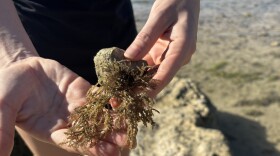-
A bill at the state Legislature would create a program supporting the production of virus- and pest-free plants to potentially reduce the spread of invasive species and diseases.
-
The Board of Agriculture and Biosecurity plans to move ahead with new measures to limit the spread of invasive coconut rhinoceros beetles on Hawaiʻi Island. The current infestation on the Kona coast started in March 2025.
-
The Hawaiʻi Wildlife Fund and Pōhaku Pelemaka submitted a joint petition earlier this month asking for officials to regulate the movement of CRB host materials around the island.
-
The Hawaiʻi Invasive Species Council has compiled over a decade's worth of pest reports into a new online dashboard.
-
The declaration forms are meant to identify unwanted plant or animal material brought into Hawaiʻi — an effort to reduce the likelihood of invasive species arriving and establishing on the islands.
-
Researchers just reported that the most abundant species of invasive algae in the main Hawaiian Islands has been found in Papahānaumokuākea at Kuaihelani, or Midway Atoll.
-
The website features interactive dashboards that provide information on pests like the coconut rhinoceros beetle, little fire ant, and coqui frog.
-
Hawaiʻi Department of Agriculture and Biosecurity officials are going door to door in Kona Palisades on Hawaiʻi Island to ask for consent from residents to treat palms on their properties.
-
Hawaiʻi Island was ground zero for invasive species like the little fire ant and coquí frog. Now, officials and community members are trying to make sure another pest doesn't gain a permanent foothold on the island. HPR's Savannah Harriman-Pote has more.
-
The sounds of invasive coquí frogs have been heard in Waimānalo since at least 2021. On a recent Thursday night, HPR's Savannah Harriman-Pote went out with a state-led team of volunteers trying to restore the soundscape of the Windward Oʻahu forest.
Play Live Radio
Next Up:
0:00
0:00
Available On Air Stations








